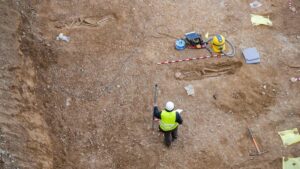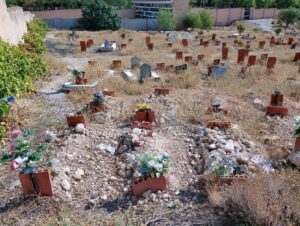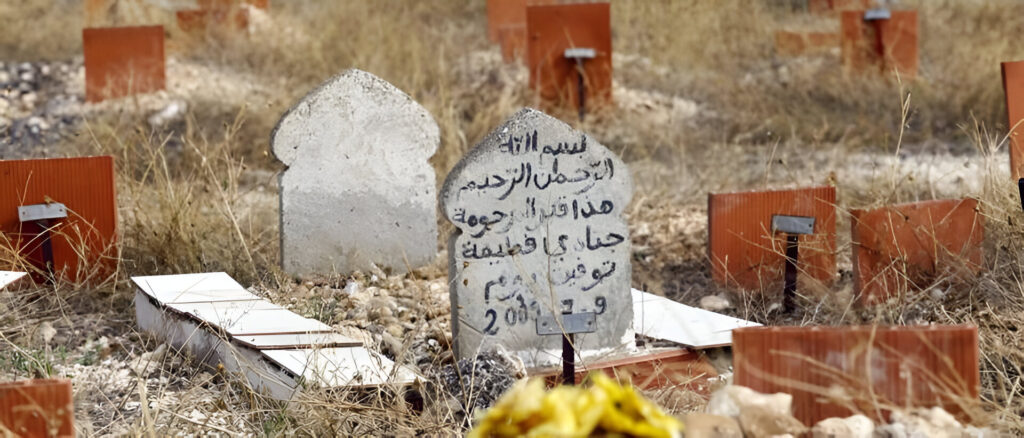Article author: Daniel Gil-Benumeya Flores
Date of publication of the article: 26/01/2024
Year of publication: 2024
Article theme: Archaeology, Archaeology, Islam, Religions.
Last 18th January the news of the discovery of an ancient Islamic necropolis in the centre of Zaragoza came to light. It is one of the remains of the various maqbaras or cemeteries that the Islamic Saraqusta (Saragossa) had, which was one of the most important cities of Al-Andalus and which maintained an important Mudejar Muslim minority after the conquest of Alfonso I the Battler in 1118. Andalusi Zaragoza was said to house the tombs of two sahaba or companions of the Prophet Muhammad, a fact that is probably false, but which undoubtedly gave prestige to the city and to those who were buried there.

Islamic cemeteries in Spanish political action
History is one of the reasons why Islam is legally considered a religion of ‘notorious roots’ in Spain and why its free exercise on an equal footing with other faiths has been regulated since 1992. Law 26/1992 of 10 November 1992 recognises Muslim communities ‘the right to the concession of plots reserved for Islamic burials in municipal cemeteries, as well as the right to own Islamic cemeteries’ and to the observance of traditional Islamic funeral rites in these cemeteries.
In practice, this and other rights enshrined in law are limited and sometimes denied, either openly or through administrative inaction and silence.
This is in accordance with the 1980 Religious Freedom Act, which establishes the right to “receive a dignified burial, without discrimination on religious grounds”. In practice, this and other rights enshrined in law are limited and sometimes denied, either openly or through administrative inaction and silence. The right to a dignified burial is probably the main institutional demand of Muslims in Spain today, especially since the COVID-19 pandemic. The desire to be buried in the place where one lives is a sign of the “notorious roots” of Muslims, which the law recognises but institutions and political and media discourse often limit or deny.
The new funerary findings in Zaragoza have coincided with the publication in the journal Miscelánea de Estudios Árabes y Hebraicos of an article by Óscar Salguero and Daniel Gil-Benumeya, members of the Grupo de Análisis sobre Islam en Europa (GRAIS) of the Universidad Complutense, which deals with the case of Zaragoza as an example of the demands of Muslims in many Spanish cities, and also as an example of how current Islamic practices paradoxically overlap with those that preceded them historically.

The case of the Torrero cemetery
As in other parts of Spain, in the Community of Madrid for example, Muslims in Aragon do not owe their possibility of being buried where they live to the protection of the religious freedom laws of democracy, but to the protectionism of the Francoist side towards Moroccan combatants during the Spanish Civil War. The Muslim cemetery of Torrero was built in 1936 and was abandoned after the war. Sixty years later, the Muslims of Zaragoza, the majority of whom are migrants, had to resort to this space in order to be buried. But for this they had and still have to deal with the Administration, since these military cemeteries, designed for a small number of people in a particular historical situation, do not have the capacity or the conditions to attend to the current Spanish citizenship of Muslim confession. On the other hand, despite the legal mandate to take appropriate measures for the observance of Islamic ritual, this is hindered and limited, so that it is only partially implemented.
Despite the legal mandate to take appropriate measures for the observance of Islamic ritual, this is hindered and limited, so that it is only partially implemented.
By means of different types of documentation (including photographs) and interviews, the article describes the vicissitudes of the dialogue between the political groups of different political persuasions that have occupied the Zaragoza City Council and the local Muslim community. It also reflects, through this case, on the ways in which Muslims interact with public administrations in Spain and the modes of representation and mediation that are put in place. The article also devotes special attention to the effects of the health crisis and the restrictions on mobility and the celebration of funeral rites caused by covid-19, which had a dramatic effect on Muslims.
As in other places in Spain, due to the scarcity of burial spaces, the Torrero cemetery is used not only by the local Muslim population, but also by the entire autonomous community and neighbouring communities. The case of the Muslim cemetery of Torrero in Zaragoza exemplifies the processes of vindication that Muslim communities in many Spanish cities are carrying out, and whose success depends both on the level of organisational consolidation and institutional recognition of the local Muslim community and on the political will of the competent administrations for a good governance that is sensitive to diversity. And it also exemplifies the contradictory way in which a religious tradition rooted in Spain by history and current demographics continues to be treated as a stranger and newcomer.
Access the full article by clicking here.


